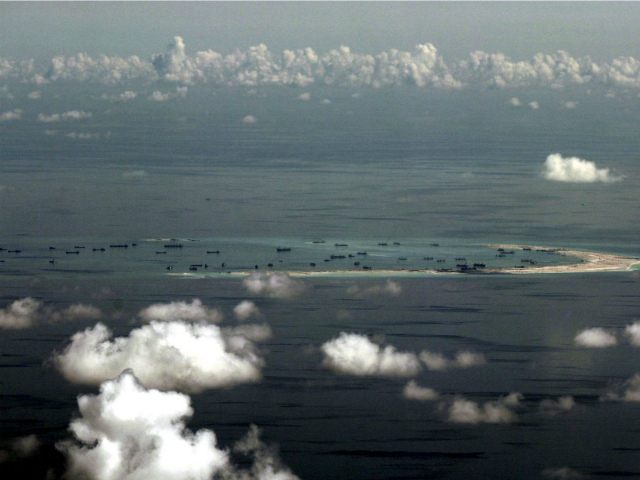Chinese state media outlet the People’s Daily released a report this week claiming that artificial island construction and the usurpation of international waters in the South China Sea would improve “marine meteorological monitoring, warning, forecasting, prediction and scientific research,” and benefit all neighboring countries with claims in the region.
“The construction of infrastructure for observation and communication is the first step towards enhancing and improving marine meteorological monitoring, warning, forecasting, prediction and scientific research,” claimed Chinese Academy of Engineering representative Ding Yihui in the article. China, the article claims, “needed meteorological facilities” in the Spratly and Paracel Islands and has a “responsibility” to provide improved weather reports to the region, according to China Meteorological Administration head Zheng Guoguang.
China has, according to some estimates, reclaimed up to 2,000 acres of land, mostly in the Spratly Islands, in the past year and a half. It has constructed landing strips for both civilian and military vessels, various military facilities, and complete artificial islands on pre-existing reefs. The territory is disputed between China and Vietnam, the Philippines, Taiwan, Brunei, and Malaysia, and before China’s attempts to colonize them, were typically of common use for fishermen of multiple nations.
Construction continues in the South China Sea, even as the Chinese government announced at a press conference this month that the “reclamation” phase of the project in the region is close to “complete.” “China will complete its reclamation project soon as part of its South China Sea construction in parts of the Nansha islands,” according to the Chinese foreign ministry. Few consider this a clear message that their construction has ended; the Chinese ministry stated in the same press conference that the end of “reclamation” meant they would “start the building of facilities to meet relevant functional requirements” not further defined.
The Philippines and Vietnam have responded with outrage and alarm. Benigno Aquino, president of the former, compared China to Nazi Germany and the expansion of their South China Sea presence to the Nazi occupation of the Sudetenland. The Philippines has also closely courted both Japan and the United States as military partners, fearing an altercation with the growing regional power. On Monday, the Philippines began joint military exercises with both Japan and the United States.
While the United States and China have clashed over the issue in the past, with a senior State Department official warning China to stop building “sandcastles” in the region, China has not responded to the joint military drills with the Philippines. A Strategic and Economic Dialogue between the two nations is set to begin this week, and the South China Sea is expected to arise as an issue.
China has nonetheless focused its state media on the ties between the Philippines and Japan, not the Philippines and the United States. In a column that appears twice on the front page of the state media outlet Xinhua at press time, the news site blasts Japan for using the South China Sea dispute to “divert increasingly intensive global attention” away from the atrocities of World War II.
Xinhua claims there is a global uproar against Japan for a “lack of remorse” regarding WWII crimes much greater than that against China for usurping larges swaths of the South China Sea. The military exercises with the Philippines, it claims, “like every other move taken by Japan regarding the South China Sea, is designed by Tokyo to achieve gains on this new front, but such calculations are unrealistic.”

COMMENTS
Please let us know if you're having issues with commenting.